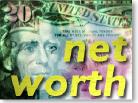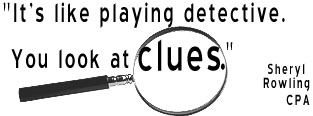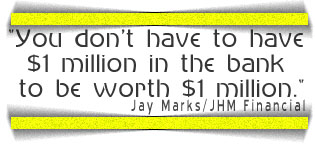|
How much are you worth?
|
 |
November 5, 1998: 10:38 a.m. ET
Many people are unaware of one of their key financial figures; net worth
|
NEW YORK (CNNfn) - Knowing your net worth is more than just having a figure to brag about (or be ashamed of). It affects everything from your taxes to your investments.
And while people may have a natural curiosity for the financial situations of the people around them, they are surprisingly often less inquisitive about their own finances.
If you don't know your net worth, you may find yourself ill-prepared for making smart financial choices.
"Your net worth is your toolbox," said Bob Klosterman, a certified financial planner at White Oaks Wealth Advisors in Minneapolis, Minn. "It shows you how much you have available to invest and it's also a guide to measure your progress."
Computing your net worth may take more self-assessment than you're used to and you may come up with some unpleasant surprises, but, ultimately, you'll be in a better position to reach your goals.
Assets vs. liabilities
Your net worth will be a constant battle between your assets and liabilities. Sometimes, your liabilities will win out, especially when you're younger, but if you pursue your strategy correctly, your assets should win the war.
Determining this figure will involve looking at three main areas; what you own, how much you make, and what financial liabilities you have.
Begin by literally taking a look around you. Your home and its contents could be one of the larger determinants of your net worth.
Starting with your house, talk to a real estate agent about how much your house might bring on the open market. You can also come up with a good figure by looking at the asking prices of similar homes in your neighborhood.
Turning to the interior, add up the current market value of your car, furniture, and have an expert tell you what any antiques, art, jewelry and other similarly valuable items are worth.
Also, don't forget to find out determine the value of any vehicles you own.

For the more mundane items in your house, such as appliances, you can look in catalogs or newspaper classifieds to get a sense of how much they might sell for.
Next, you'll want to determine how much cash you have on hand. This means more than just opening up your wallet and looking.
Start with the obvious areas. Total up the amount you have deposited in your savings and checking accounts. After that comes your investments.
It may be painful, but calculate the value of all your stock and bond holdings, along with any other securities.
You'll probably have other investments you'll have forgotten about as well.
"It's easy to overlook things," said Klosterman. "People tend to forget very important things like 401(k) plans and other retirement plans."
However, you can only include the amount in your retirement plan in which you're vested. The point of calculating your net worth is to discern how much you would have if you stopped working at the present time.
The next part of the process involves knowing how much money you make. Obviously, begin with earnings from wages, salary, tips, commission, interest, dividends and retirement benefits.
Don't forget to add in other sources of revenue, such as money received from relatives and also government funds like social security or other like benefits.
At this point, you might be feeling kind of good about yourself and maybe even surprised, according to Jay Marks, president of JHM Financial Services.
"Some people have no idea that they have accumulated the type of wealth they have," said Marks.
"You don't have to have $1 million in the bank to be worth $1 million. Once you include your house, stocks and 401(k) plan, you might have more than $1 million."
The warm, fuzzy feeling of that figure won't last long, however. The second part of the net worth figure is liabilities, and they can knock down your asset figure pretty quickly.
People tend to have a better handle on their liabilities than they do their assets, according to Sheryl Rowling, a certified public accountant at Rowling, Dold & Associates in San Diego, Calif.
"People don't usually forget liabilities because they often must be paid every month," she said.
These costs include rent, mortgages, car payments, various insurance payments and are known as fixed costs since they need to be taken care of every month.
In addition, you will also have various flexible costs. These are also expenses which come up every month but ones you have more control over, such as food, clothing, utilities and other household expenses.

It can be the miscellaneous expenses where people really get into trouble, said Marks. As part of the net worth process, Marks has his clients calculate their non-essential expenses.
"I ask them where they are spending the money," said Marks. "Sometimes I point out to a couple that they are spending thousands of dollars each year on restaurants. They had no idea."
Other liabilities may slip beneath your radar and you won't find out about them until a later date, usually April 15. Rowling explained often people don't take into account their upcoming income tax when tabulating their expenses.
Once you've subtracted your liabilities from your assets, you'll have your net worth.
Don't get discouraged if the your net worth figure isn't what you might have hoped it would be. The net worth number will fluctuate and that doesn't necessarily mean you're messing things up.
For example, a young couple who has just purchased a home may have put much of their savings and other assets into making the down payment and other related expenses.
At that point their net worth would probably be quite low. However, from an overall financial perspective, they have set themselves up for a stronger monetary position in the long run.
Building your net worth
The next step is figuring out how to build up that figure. "It's like playing detective," said Rowling. "You look at clues and from those clues you make your decisions."
As a CPA, tax issues are the ones that jump out first to Rowling as she evaluates her clients positions.
"You would need to do an income evaluation from a tax return standpoint. You may have investments that are throwing off capital gains income. If you're in a low-tax bracket, you shouldn't have assets in tax-free municipal bonds," she said.
Investors may have other inappropriate investments, such as having tax-free bonds in a tax-free retirement account. Sometimes, she said, these inefficient investment choices only come to light once someone goes through the net worth process. Once they are brought to light, people can put their money in a better investment.
The goals you have set will be an important part of where you go next. Again, this is an area where people have often dropped the ball, relying on vague goals of financial security.
The more specific, the better, according to Marks. "Individuals need to set certain goals, such as sending children to school or retiring with 60 percent or 70 percent of their annual income."
With your net worth and cash flow figures set, you can also make some decisions about the various types of debt you're currently holding. For example, with today's low interest rates, it may be better to take out a home equity loan to pay off high-interest credit card debt.
At then end of this process, you'll probably feel a little overwhelmed. You probably won't want to hear financial experts recommend going through the net worth process annually in order to keep on top of your finances.
However, after you've assessed your net worth once, the process should be easier the next time. If you keep on top of your expenses and other changes in your financial picture, you may soon find that your net worth may someday be worth bragging about.
-- by staff writer Randall J. Schultz
|
|
|
Retirement Planner
|
Note: Pages will open in a new browser window
External sites are not endorsed by CNNmoney
|
|
|
|
 |

|

